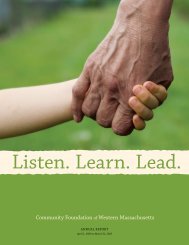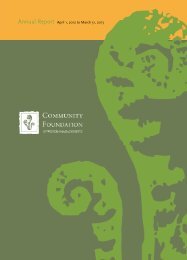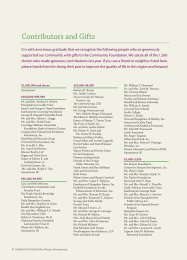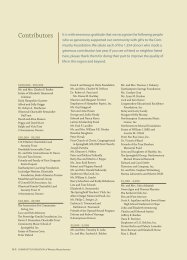Annual Report - Community Foundation of Western Massachusetts
Annual Report - Community Foundation of Western Massachusetts
Annual Report - Community Foundation of Western Massachusetts
You also want an ePaper? Increase the reach of your titles
YUMPU automatically turns print PDFs into web optimized ePapers that Google loves.
S T A R T I N G A F U N D<br />
A Closer Look at Fund Options<br />
Unrestricted<br />
Donors choose this fund to use the <strong>Community</strong><br />
<strong>Foundation</strong>’s expertise to the greatest advantage for the<br />
community by responding to emerging and changing<br />
needs through a competitive grantmaking process. A<br />
Distribution Committee <strong>of</strong> involved and committed<br />
citizens, chosen for their extensive knowledge <strong>of</strong> both<br />
the needs and the nonpr<strong>of</strong>it resources <strong>of</strong> the community,<br />
and aided by the <strong>Foundation</strong>’s pr<strong>of</strong>essional staff<br />
and a group <strong>of</strong> volunteer project reviewers, carefully<br />
evaluates every application for funds, usually with an<br />
on-site visit. The Committee’s carefully disciplined decision-making<br />
process provides unequaled access to the<br />
community’s collective wisdom about how to allocate<br />
scarce charitable funds for maximum effectiveness.<br />
Field <strong>of</strong> Interest<br />
This fund allows a donor to concentrate on specific<br />
areas <strong>of</strong> charitable endeavor (i.e. education, elderly,<br />
environment, the arts). If desired, they can also utilize<br />
the expertise <strong>of</strong> the Distribution Committee and its<br />
competitive grantmaking process.<br />
Donor Designated<br />
Donors can direct that distributions from a fund be<br />
made to one or more specifically named charities.<br />
Typically such funds are endowed, allowing for the<br />
perpetual support <strong>of</strong> these organizations.<br />
Donor Advised<br />
Donors are directly involved in this type <strong>of</strong> fund,<br />
recommending the amount and timing <strong>of</strong> grants to<br />
charitable organizations.<br />
Education<br />
The <strong>Community</strong> <strong>Foundation</strong> has one <strong>of</strong> the largest<br />
scholarship and loan programs in the country. Donors<br />
can support students in pursuit <strong>of</strong> higher education<br />
by helping defray the rising costs <strong>of</strong> tuition. Like the<br />
Distribution Committee’s competitive process for<br />
unrestricted funds, the <strong>Foundation</strong>’s volunteer-based<br />
process for awarding scholarships and loans represents<br />
the community’s collective wisdom about the use <strong>of</strong><br />
scarce charitable funds. Because <strong>of</strong> the administrative<br />
costs <strong>of</strong> such grants, scholarships and loans are not<br />
made for amounts less than $1,000.<br />
Agency Funds (advised and endowed)<br />
Nonpr<strong>of</strong>it organizations establish funds in order to<br />
build their own supporting endowments and take advantage<br />
<strong>of</strong> the <strong>Community</strong> <strong>Foundation</strong>’s sophisticated<br />
investment management and other support services.<br />
Planned Giving Expenses<br />
The <strong>Community</strong> <strong>Foundation</strong> does not charge for its<br />
services in administering charitable gift annuities<br />
or charitable remainder trusts, but does charge for<br />
preparing the necessary tax returns (currently $125<br />
for Gift Annuities and $250 for Remainder Trusts),<br />
and for investing the donated assets. These charges<br />
will not affect the amount paid to the annuitant or<br />
to the life beneficiary <strong>of</strong> an Annuity Trust. After<br />
the death <strong>of</strong> the life beneficiary(ies), the <strong>Community</strong><br />
<strong>Foundation</strong> will levy its customary fee on the<br />
endowed fund established by the annuity or trust.<br />
Key Information<br />
Minimum Balance<br />
It is not economical for the <strong>Community</strong> <strong>Foundation</strong><br />
to maintain a fund for the long-term with a balance<br />
less than $10,000. In order to encourage the<br />
establishment <strong>of</strong> new funds, however, the <strong>Foundation</strong><br />
will start a fund with as little as $2,000, provided<br />
there is a plan to build the fund to the $10,000<br />
minimum in five years or less. Amounts in excess<br />
<strong>of</strong> that minimum each year (including earnings<br />
from the fund’s investment) would be available for<br />
recommended distribution; distributions are not<br />
made from endowed funds until the $10,000<br />
minimum is reached.<br />
Scholarship funds require a higher fund minimum<br />
<strong>of</strong> $25,000 to support the distribution <strong>of</strong> a minimum<br />
scholarship award <strong>of</strong> $1,000 annually and the higher<br />
cost <strong>of</strong> administering these complex types <strong>of</strong> funds.<br />
Contributions to existing funds are accepted in<br />
any amount.<br />
58 <strong>Community</strong> <strong>Foundation</strong> <strong>of</strong> <strong>Western</strong> <strong>Massachusetts</strong>








